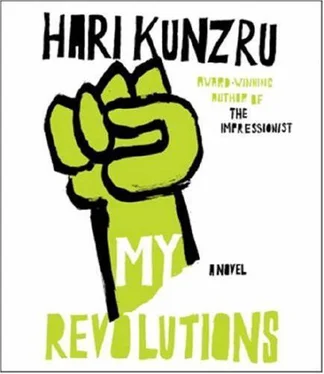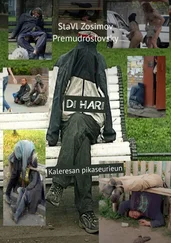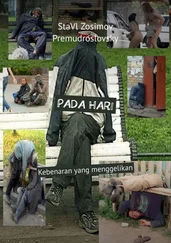We made our way up Euston Road, slowing to a crawl outside the grimy façade of St. Pancras station.
“Where are we going, Miles?”
“Don’t worry. Just a business breakfast. If you relax, we’ll be out of there in half an hour and I won’t be bothering you again for a while.”
“Really?”
“Yes, really.”
We turned into a side street near King’s Cross and parked outside an office building, some kind of recent warehouse conversion, all sandblasted bricks and plate glass, fashionably facing the canal. The driver opened the glove compartment and retrieved his computer game, placidly resuming the arrangement of little falling bricks into a wall. The big man disappeared inside the building and came out again with a set of laminated visitor passes.
“Now,” said Miles, “this is an informal, walk-around event. Just let me guide you. I’ll be right beside you. You don’t have to do anything at all. You don’t even have to speak.”
We walked past the front desk into a large function room, which had been laid out as some kind of exhibition space. A girl handed us each a folder, pointing us toward a table laid with coffee urns and pitchers of juice and platters of large, rubbery-looking croissants. We wandered around, past photographic displays and architectural models presented on felt-covered tables. Little prison wings. Little model figures banged up in little cells, playing Ping-Pong with one another in little rec rooms.
“Architects,” said Miles, gesturing at the people around us, who
were balancing cups and saucers and peering surreptitiously at one another’s name tags as they made conversation. “Architects and detention-center contractors. And Home Office people, of course.”
Pat Ellis was at the center of a knot of acolytes, who were listening to her with rapt attention, first nodding in agreement, then laughing doggedly at a joke. Without preamble, Miles gripped my arm and steered me toward her, pushing his way into the circle.
“How nice to see you, Minister,” he said, cutting through the laughter.
Pat Ellis looked momentarily nonplussed, then nodded curtly and continued her anecdote. She was talking about a visit she’d made to some facility in Holland, what she’d said to the director, what he’d said to her. The young man at her side, obviously some kind of aide, frowned at us.
Miles plowed on. “You remember Chris Carver, don’t you?”
The minister broke off again and smiled at us, a neat and practiced smile, which gave the impression of warmth without masking her irritation. “No, I’m sorry. You’ll have to remind me.”
“Chris Carver,” repeated Miles. “Think back.”
I looked at Pat. She used to have long chestnut hair, which she often wore in a scarf. It was gray now, bunched up in a tight, unflattering perm. She was dressed in business uniform, like all the people around her, a dark suit, a string of pearls doubled over the mottled skin of her neck. I’d seen her the previous day, of course, and before that on television, but I was unnerved to find myself so close to her. I couldn’t find a trace of the nervous, hardworking young woman I’d once known — crushingly sincere, easily moved to tears. The features were the same, the long nose and the large widely spaced eyes, but the thin-lipped mouth (which I’d kissed once, in the middle of a drunken party) had a twist of placid vanity, the curdled self-assurance of the professional politician. She looked at me blankly, complacently, not recognizing me. Then she made the connection. I could see it happen, the loss of traction, the sudden skid on the ice.
“No, I’m sorry, Mr. — uh. .”
“Carver,” repeated Miles.
For a moment she was completely speechless. She looked at the floor, then at her assistant. Everyone was waiting for her to say something. Reluctantly she turned her eyes back to me and her expression was momentarily unguarded, almost warm. I realized, bizarrely, that somewhere inside she was pleased to see me. Then a flash went off. Miles’s young thug had taken a picture. Instantly, the barriers slammed down. She looked about, coldly furious, trying to spot the photographer. I opened and closed my mouth. I wanted to say something, to disrupt the trap Miles was setting.
“Sorry, Pat,” I said. “I’m really sorry.”
“Yes,” interrupted Miles. “My apologies, Minister. I thought you knew each other.”
He grabbed my elbow and steered me away, leaving Pat Ellis behind us, hissing into her assistant’s ear. Miles’s thug was on the other side of me, his hand on the small of my back, propeling me discreetly but firmly toward the exit. Angrily, I shook them both off, a violent gesture that made people turn and watch. “Excuse me, are you with the press?” asked one of the PR women, when we reached the door. “This is a private event. There’s no photog- raphy.” Miles made an inconclusive hand gesture at her as we brushed past.
We got into the car. The driver put away his game and pulled out onto the street. “Well,” said Miles, keying a text message into his cell phone, “a bit crude, but we’ll just have to see if she takes the hint, won’t we?”
While I tried to understand what had just taken place, Miles relaxed into his seat, received an answer to his text, read it, and slipped the phone into a jacket pocket.
“What hint?” I asked quietly.
“Put it this way. There are some people it’s just not appropriate for the next Home Secretary to know. That is, if she wants to be the next Home Secretary.”
“I keep telling you, she had nothing to do with anything. I didn’t see her or Gavin after 1969.”
“Well, you say that, Chris. And, of course, you could well be telling the truth. But if you were a journalist, the possibility would certainly be worth following up, wouldn’t it?”
“You can’t give this to the press.”
“Why not? I’d say it was in the public interest.”
“Why not? Please, Miles, you keep saying you’re my friend. Think about my — my wife. Our daughter. Our daughter knows nothing about any bombings. Think what this would do to her.”
“Yes, I do understand. You’re Michael Frame, suburban family man, and you were rather hoping it would stay that way. But you must have known, Chris. Sooner or later it was going to come out.”
“But why? You’re not the police. This isn’t about bringing me to justice or anything straightforward like that. Whatever job you’re doing, I know you don’t give a shit about justice. What did Pat Ellis do to you, Miles? She must have done something.”
“To me? Nothing at all. It’s just politics, Chris. Real, grown-up politics, not the kind that starts by carving out a Utopia and then hammering at the world, trying to make it fit. If she’s going to get the top job, she’ll have to make sure all the stakeholders are satisfied. Simple as that. No mystery. No conspiracy theory. If everyone’s happy, then this all goes away. There’ll be no need to bring you any deeper into it and you can fuck off back to Sussex. But if Mrs. Ellis doesn’t play ball, she’ll find the media beginning to focus on certain issues of character.”
I stared out of the window, and Marylebone Road was just a jumble of planes and reflections. Miles sighed, adopted an avuncular expression, and squeezed my shoulder, one — two — three, an autistic mime of sincerity. “I am your friend, Chris. Really. And as your friend, I think you should tell your family. They deserve to be let into this as gently as possible.”
I wanted to kill him, to smash his face to a bloody pulp. “And
what am I going to let them into, exactly? That Daddy’s a terrorist and he’s going to prison?”
He shrugged blandly. “Not necessarily. Everyone knows this all happened a long time ago. Yes, you did certain things, but — well, the context has changed. People are quite pragmatic, these days. I won’t pretend that there won’t be pressure for an — um, judicial dimension, but there are ways you could make the climate as favorable as possible. If you had something to give, for example.”
Читать дальше












